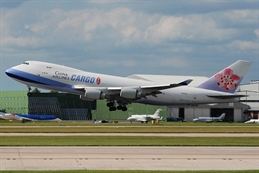
China Airlines Cargo reported that 2021 was the best year in its 62 year history, with the carrier achieving multiple records that year.
In a statement, the cargo carrier said it exceeded TWD100 billion (US$3.6 billion) in cargo revenue for the full year 2021 and its cargo revenue in December also exceeded TWD15.4 billion (US$556 million).
For the same month, China Airlines also exceeded TWD10 billion (US$361 million) in cargo revenue for five consecutive months and completed more than 100 cargo charter flights in a single month.
"2021 proved a record-setting year for the China Airlines Cargo team. Even as the impact of COVID-19 was felt all around the world, China Airlines switched to a cargo-centric business model that put its fleet of 21 freighters to full use," the Taiwan-based carrier said. "The non-stop movement of cargo kept the economic lifeblood of Taiwan and the world flowing."
"2021 was in fact the best-ever year in Cargo's 62-year history."
China Airlines noted that a fleet of 21 freighter aircraft including three newly introduced 777F freighters and the existing eighteen 747-400F freighters helped China Airlines strengthen its competitiveness in the air cargo industry.
The cargo carrier said it made around 540 freighter flights per month or an average of 120 flights per week.
"Total revenues broke all past records and single-month cargo revenues of more than TWD 10 billion represented a new peak that boosted China Airlines’ ranking in the global cargo industry," it added.
Keeping the supply chain moving
The Taiwan-based carrier noted that since the start of the COVID-19 pandemic, the air cargo market has undergone structural changes. It said in addition to the transportation of epidemic prevention supplies, China Airlines continued to ensure the continuity of supply for economic growth goods and everyday necessities ranging from auto parts, semiconductor chips to actual vehicles and high-precision wafer machinery.
It said shortages in sea cargo capacity meant that e-commerce, textile and other industries that traditionally went by sea now relied upon air cargo as well.
The carrier also noted how the pandemic spurred the rapid growth of the stay-at-home economy and a jump in online shopping — boosting the need to transport fitness equipment, vacuum cleaners, gaming consoles, boutique handbag brands, and even machines for mining digital currency are just some of the goods carried aboard cargo charters.
Aside from home goods and apparel, the carrier also noted how travel restrictions drove demand for gourmet food that "led to a surge in demand for fresh and perishable goods" including meats and seafood Japan, North America and Australia, among others.
"China Airlines' world-spanning cargo network is now flying fresh and perishable products from across the world to food lovers in Taiwan," the carrier said, adding that it is the first airline in Taiwan to receive the CEIV Pharma certification for pharmaceutical cold-chain logistics.
Expansion of cold chain business
During the period, the carrier also moved more than 75 million doses of Covid-19 vaccines weighing over 350 tonnes to date.
"Additionally, the rapid growth of China Airlines’ cold chain transportation business has seen a jump in the use of temperature-controlled containers," the carrier continued. In 2021 more than a thousand temperature-controlled containers were transported by China Airlines, which represents a growth of more than 100% compared to that of pre-pandemic levels.
"In the future, China Airlines will continue to focus on its cargo operations, closely monitor developments in the passenger market, and carefully review its passenger market strategy, as it works to maximize its operational profits," China Airlines added.



